Can I breastfeed my mother?
Last reviewed: 23.04.2024

All iLive content is medically reviewed or fact checked to ensure as much factual accuracy as possible.
We have strict sourcing guidelines and only link to reputable media sites, academic research institutions and, whenever possible, medically peer reviewed studies. Note that the numbers in parentheses ([1], [2], etc.) are clickable links to these studies.
If you feel that any of our content is inaccurate, out-of-date, or otherwise questionable, please select it and press Ctrl + Enter.
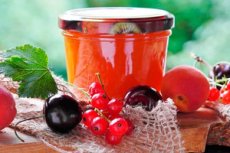
This question repeatedly worries young moms, because in the period of breastfeeding all the dietary preferences of the mother should be revised towards foods that are more beneficial for the baby? But is it really possible to eat no jam and what to eat at all?
According to current recommendations, you do not need to exclude any food from your diet. The use of a nutritious diet, filled with a variety of healthy foods, helps maintain health and supplies your baby with the nutrients necessary for it to grow properly. If you do not have allergies to strawberries or any other berry, then you can safely include them in your diet as a jam. However, watch your child and his negative reactions.
If to speak in general, then the answer to the question, is it possible to make jam with lactation, unambiguous - it is possible! But here's what jam can be nursing mom, you need to very differentiated approach to this issue.
Unlike butter, margarine, nutella and cheese, jam does not contain cholesterol and fats, which are harmful to your body. Jam is rich in sugar and a great source of energy and fiber.
Jam is a concentrated food source when it is made with fully ripened fruit. Preparation of mixed types of jam usually has a more pronounced flavor, but only monocomponent types of jam are allowed for feeding.
Jam is a canned product of fruit origin. While many fresh fruits to mom can not be due to the risk of allergic reactions and possible dyspepsia in the baby, cooked fruit can be an alternative. Naturally, when cooking or preserving fruit for jam, many useful substances are lost, but some vitamins are still there. Therefore, you can eat jam with lactation, but you need to figure out which one will be most useful.
How to choose a jam with lactation?
Is it possible to breastfeed homemade jam? This issue is really important, because the shop jam is not at all as tasty as a homemade jam. And if the jam is prepared correctly, it is really better to give preference to the home. After all, you can cook it from the best fruits and save a maximum of vitamins. Homemade jam is the best choice for the mother, as it is made with pieces of fruit, and not just with juice. Pieces of fruit in the jam will provide additional nutrients, as well as fiber. In addition, you need to take note of the amount of sugar and the type of sugar used to make your jam. Therefore, preference is given to home-made products, which contain a certain amount of sugar and other useful fruits.
What is better to eat jam? Strict restrictions are not, but you must remember about proper nutrition and minimized use of harmful carbohydrates. Therefore, it is better to leave fresh buns for later, when you are sure that they will not harm you.
How much can you eat jam with lactation? To begin with, try to eat the minimum amount of jam and observe the reaction of the baby at the same time. If you eat 20 grams of jam, and after a day the baby does not become more restless than usual, it means that everything is in order. Also, you should pay attention to the baby's skin, and see if there are any rashes or redness. It is necessary to pay attention to the chair of the child, if it is the former, then you can eat this jam in the same amount. Increase the dose of jam is not recommended, it is better to eat less, but regularly.
Raspberry jam
Contains a large number of vitamins, which are very necessary to maintain good skin health, as well as the general condition of the body. Sweet and juicy raspberries are filled with a variety of nutrients that are ideal for the organism of a nursing mother.100 grams of raspberries contain only 52 calories with zero cholesterol. It is also a good source of saturated fat, a healthier version of fats, which are necessary for the production of hormones and energy.
Jam from raspberries also produces a good amount of carbohydrates, which keeps the muscles and the work of the central nervous system. 6.5 grams of dietary fiber, which is 16% of the recommended daily intake, stimulates movement in the intestines, thereby improving bowel movement.
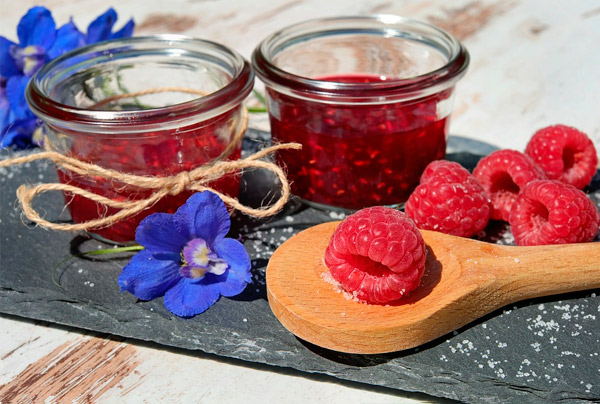
Overweight is one of the problems that many mothers face after giving birth. This product can be used to reduce weight, because it is rich in manganese and dietary fiber, which helps increase the metabolic rate, thereby preventing the accumulation of fat in the body. Raspberry jam can have a positive effect on weight management due to two powerful compounds called ketone and tyroside. These properties are very effective antioxidants, which purify the body of toxins. Raspberry is one of the rare sources of ketone. This property can not be found in any other fruits and vegetables. Ketone enhances the metabolism of fats in the body, thereby increasing oxygen consumption. This will result in less body fat, especially in fat cells. Consumption of raspberries also slows the activity of pancreatic lipase. It is a digestive enzyme that absorbs fat. If the pancreatic lipase slows down, the body can absorb less fat, which prevents obesity. The content of tyroside avoids inflammation, which leads to the development of unwanted fats.
Raspberry, used to make this jam, contains ellagic acid and prevents the appearance of cancer by neutralizing free radicals in the body that cause cancer. This fruit also contains some antioxidants that prevent the accumulation of harmful substances in the body, which can lead to certain complications with health. Raspberry is an excellent source of vitamin C. This vitamin develops the body's resistance to infectious elements. Vitamin C is one of the most important vitamins that the body needs. Vitamin C stabilizes the general state of health. With a sufficient amount of vitamin C in the body, protection against common diseases is established. Vitamin C cleans the body at the cellular level. It stops the accumulation of free radicals, which leads to disorders that lead to diseases and illnesses.
Raspberry jam also provides a significant amount of vitamins E and K. Vitamin E normalizes cells and tissues. It also protects the red blood cells. Vitamin K, on the other hand, is very important for blood clotting and maintaining liver health.
In addition to the aforementioned vitamins, raspberry jam is also an excellent source of minerals, including manganese, copper, potassium and iron. 29% of manganese found in raspberries helps to convert fats and protein into energy, as well as to the formation of bones and cartilage, the latter useful for healing wounds. Copper also helps in the formation of bones, as well as in the formation of erythrocytes and in the metabolism of iron. Iron interacts with copper when creating red blood cells, because it functions in the synthesis of DNA. Finally, 3% of potassium works to balance the fluid in the body. Vitamins, including various flavonoid substances, make raspberries a rich source of antioxidants, which are necessary for the body of the mother and child.
These flavonoids are one of the most effective antioxidants that can optimize not only the function of the heart, but also the functions of other parts of the body. Flavonoids prevent inflammation, avoiding the accumulation of platelets. This antioxidant also regulates blood pressure, relaxing the veins and arteries to optimize blood circulation from and to the heart. It also strengthens the walls of the arteries to reduce the risk of blood clots.
Raspberry jam is an excellent source of fiber, which, as is known, regulates proper digestion. It also has a high water content, which helps to smooth the digestion process. It is very important that the digestive process is carried out appropriately, because the body absorbs the nutrients extracted from the food we consume. If the food is not properly destroyed, the body will not have enough vitamins and minerals necessary for optimal functioning. This can lead to abnormalities that lead to illness.
Another important property of raspberry jam in particular for your baby is that it protects the retina from damages that can cause infections, frustration and even blindness.
Apricot jam
This is one of the healthiest fruit jams in the world, with many advantages. 100 grams of apricot jam give you 12% of vitamin C, 12% of vitamin A and 6% of the potassium required by the body - all in less than 50 calories. Apricot jam contains vitamin A, which is also known as retinol. It is a fat-soluble vitamin that helps, in particular, in improving vision. And it keeps the immune system under control, protecting your skin in the process. Retinol and beta-carotene (also present in apricots) also reduce the chances of visual disturbances in mom and baby.
If your jam with pieces of apricot, then apricots are a good source of dietary fiber. Given that retinol in the apricot is fat-soluble, the fetus is easily dissolved in the body, and important nutrients are easily absorbed by the system. And it quickly destroys fatty acids, which means that your digestion is in order.
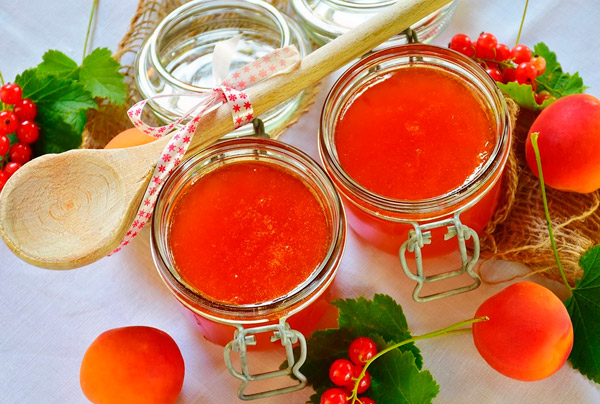
Given that apricot jam contains a lot of fiber, it helps reduce the bad cholesterol in the body, and that means your heart is protected. And at the same time it increases good cholesterol. In addition, the potassium content balances the electrolyte levels in our system, keeping our heart muscles in order.
Apricot jam is a natural source of antioxidants. Antioxidants, in turn, also kill free radicals that damage our cells.
Any plant products that contain iron have non-heme iron, which is also found in apricot jam. This type of iron takes time to absorb the body, and the longer it remains in the system, the better your chances of preventing anemia. It is recommended to take vitamin C together with it to provide better absorption of iron.
Dietary fiber in apricot jam improves the digestive system of mom and baby. Therefore, a moderate amount of apricot jam will be very useful for a nursing mother, taking into account also the low allergenic potential of this product.
If you are breastfeeding during a period of active growth of strawberries, then you are not recommended to try fresh strawberries, even despite all its useful properties. In this case, the alternative may be jam, which is considered less allergenic than fresh berries. Strawberry jam is filled with many vitamins and minerals that you and your baby need for good health. Many breastfeeding mothers lack iron, and adding strawberries while breastfeeding is one way to increase your intake. One serving of strawberry jam also provides a small amount of calcium, magnesium and potassium. Strawberry is a healthy source of vitamin C, which you need every day while breastfeeding.
Strawberry jam
These are natural fibers and vital vitamins, minerals, amino acids and other nutrients that have a low sugar content.
Strawberry jam is an important place in the development of nerve fibers, which is important in the stage of intensive growth of your baby. Strawberry with a high content of antioxidants protects brain cells from damage due to free radicals. They also change the way neurons interact in the brain with each other. This ultimately leads to an improvement in the formation and conduct of nerve impulses, which can improve the memory of your baby.
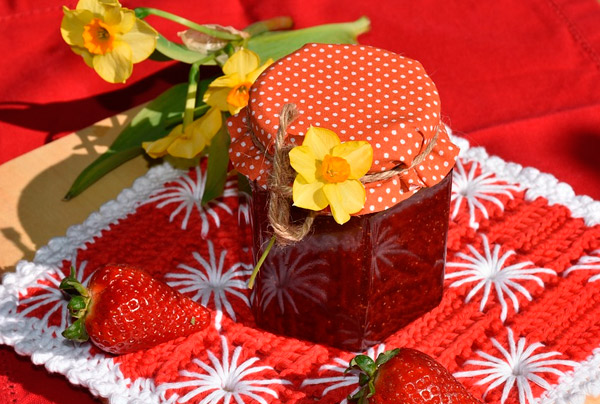
Strawberry jam contains quercetin, and consumption of quercetin along with regular exercises can reduce the formation of plaques of atherosclerosis.
Strawberries are also rich in vitamin C, which plays an important role in preventing inflammation.
It is known that strawberry contains pectin, which is a type of soluble fiber that lowers the level of LDL (bad cholesterol) in the body.
Strawberry jam can cause colic, fussiness and discomfort in infants. If your child has colic, he will probably cry, act fussily or pull his legs to the chest in pain. Watch your child's symptoms and avoid strawberries to see if they disappear within the next few days.
Highly allergenic foods can pass through your breast milk. Strawberries are very allergenic foods, which means that it can cause an allergic reaction, even if you eat jam. Symptoms of an allergic reaction may include fussiness, diarrhea and skin rash. If your child exhibits any of these symptoms after you have eaten strawberry jam, do not eat it anymore.
Jam from a currant
Has a wide range of health benefits. In addition, blackcurrant berries contain much more vitamin C than any other natural plant or food source (about five times more than fresh orange). When it comes to vitamin C-rich foods, black currant jam is super-food. The nutritional benefits of vitamin C for the body are significant. It is used by our body for protein metabolism and collagen formation.
The violet color of black currant indicates the presence of anthocyanins, which have exceptionally strong antioxidant activity, as well as other qualities that promote health.
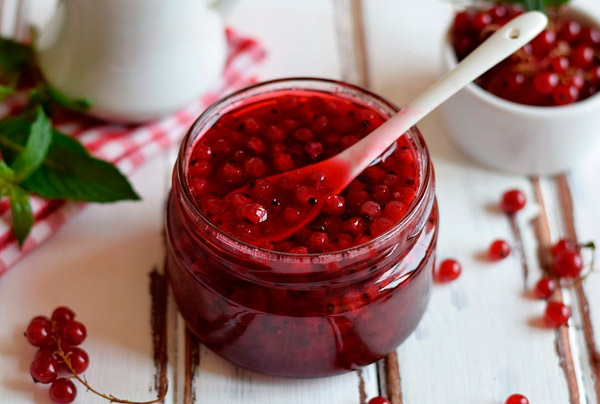
Studies show that black currant jam is significantly higher in levels of antioxidant activity than other fruits. And even if you eat black currant in the form of jam, it is important to know that the antioxidants of black currant look very stable and remain active after treatment.
Another important advantage of black currant jam is that it contains many Omega-3 fatty acids, which are also great for strengthening heart health. These essential fatty acids can reduce the level of low-density lipoprotein (LDL) or "bad cholesterol" and at the same time increase the amount of high-density lipoprotein (HDL) or "good cholesterol" in the blood. Also, acids take part in the development of neural connections in your baby's brain.
Black currant has excellent antibacterial properties, as it contains chemical compounds - tannin and anthocyanin. Both can prevent the growth of bacteria in the urinary tract, so the currant preserves prevent infections of the genitourinary system.
Taking into consideration the good tolerability of the baby along with the use of currant jam, you can try to add such jam during breastfeeding.
Cherry jam
Contains many vitamins, such as vitamin C, potassium, as well as beta-carotene.
Cherry, like the fruit itself, has a high water content; the increased use of water will certainly lead to an increase in energy levels, as well as to an improvement in the metabolic process. If the cherry jam is cooked correctly without the excess of sugar, then the benefits of cherry are also preserved.
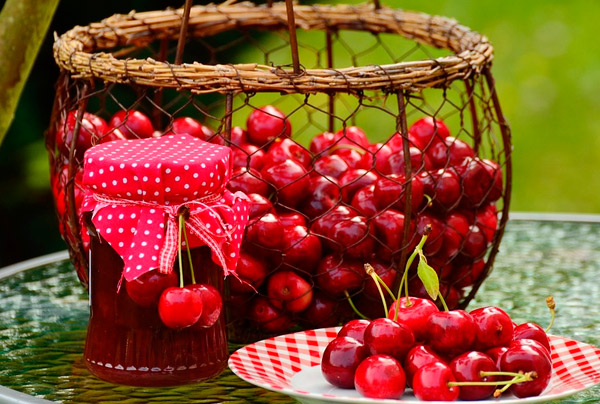
Cherry jam has some useful properties. Anthocyanins, antioxidants in cherry jams are substances that are associated with protection against free radicals, as well as inhibition of cyclooxygenase enzymes. Therefore, cherry jam has an anti-inflammatory and analgesic effect, equating to alternative medicine.
In the jam of dark varieties of cherries there is quercetin, ellagic acid and a large amount of melatonin. All these components effectively act on the nervous system of the mother and improve the duration of sleep and treat insomnia.
Cherry jam contains antioxidants and provides an excellent source of vitamins B1-B3, B5, B6, C, K, potassium and magnesium for the body. It has a low fat content, and also does not contain cholesterol, therefore jam is an ideal snack or even a treatment that helps to lose weight.
 [1]
[1]
Plum jam
Unlike butter and cheese, do not contribute to the content of cholesterol and fat and, thus, are the preferred emphasis on breakfast for nursing moms. Plum jam is one of the most useful types of jam to improve digestion. Pectin is a substance contained in all fruits. In the process of heating during the preparation of jam this substance is modified. Modified pectin enhances peristalsis and helps with constipation, which can act not only on the mother, but also get into breast milk and prevent constipation in the baby.
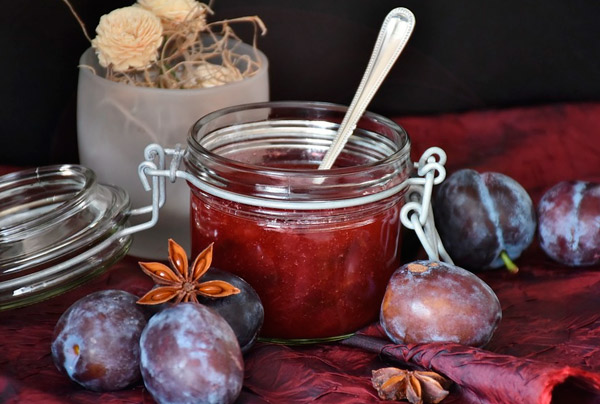
Plum jams are rich in sugar and a good source of energy. Plums are rich in fiber, vitamin C, A and antioxidants. Plum contains a good amount of magnesium, which can relax the muscles and prevent stress. Given the low allergenic activity, a young mother can eat plum jam in a moderate amount without harm to the baby.
Blueberry jam
It is filled with nutrients and is widely known for its health benefits, especially for children. And if mom will eat jam even while feeding her baby, then the effect on brain development in the baby will be significant. Bilberry is considered one of the most nutritious berries. One cup of blueberry jam (148 grams) contains 24% of the recommended vitamin C, 36% of the recommended vitamin K and 25% of manganese, in addition to fiber.
Blueberries consist of approximately 85% water and have very low calorie and carbohydrate levels, but are rich in nutrients. Antioxidant compounds found in blueberries are able to maintain their protective properties even after heat treatment. Blueberry jam also helps maintain brain function, reduces oxidative damage to brain cells and improves the memory of your developing baby.
Pear jam
Unlike plum, it has a binding effect, so when choosing this or that jam, you should pay attention to what kind of chair your baby has. Pear jam is also very useful for young mothers. The health benefits of pear jam for babies include a good source of vitamins, minerals and antioxidants. It is easily digested, helps in healing wounds faster, stimulates the immune system, and also has antimicrobial properties. One of the main reasons why pear jam should be included in the maternal diet when breastfeeding is to provide the necessary vitamins and minerals besides regular supply of carbohydrates, protein and fat. Pears contain a number of vitamins, such as vitamin A1, B1, Niacin, B2, Niacin, Folate, E and C. There are important mineral extracts such as potassium, copper and phosphorus in pears with low sulfur, magnesium, calcium, iron , sodium and chlorine. There are several varieties of pears that have a very rich source of iron in them. Vitamins and minerals play an important role in the overall development of your child, including strengthening the immune system, improving vision, bone growth, brain development, and the production of red blood cells. Each vitamin and mineral plays an important role in the overall development of your child. And all these vitamins come with breast milk before the period of six months. Since the fresh fruit of the pear can have some side effects, it is better to give preference to pear jam.
Pear jam is one of the richest suppliers of antioxidants.
Antioxidants are those biochemical substances that are important for protecting cells, tissues and DNA from damage. Because the food we eat, breaks down into certain nutrients and is consumed in every cell of our body, as a residue, the cell releases certain chemicals known as free radicals. These free radical molecules do not have electrons, and to stabilize chemically they pull electrons out of any point, including cells, tissues and even DNA. This leads to damage to cells and DNA, which can sometimes be irreparable. Infants are also vulnerable to attacks by free radicals. Thus, the provision of fruits, vegetables and herbs regularly in the mother's diet helps to maintain the level of antioxidants.
The flesh of pear fruits is very soft and tender. This makes the jam from these fruits one of the ideal candidates for good mastering by the mother. It is also useful at a time when your child is suffering from digestive problems, including a tendency to functional diarrhea.
Pear jam has antimicrobial properties. This quality has biochemical substances from the pear. They are effective against bacterial species that usually cause disease.
Another advantage of the pear fruit is the healing property of wounds. Also the pear is very good for the immune system. The immune system is stimulated by biochemical substances, such as caffeic acid and chlorogenic acid. These biochemicals enhance the immune alertness of the body. The measures that must be taken while breastfeeding your child and eating pear jam are the prevention of allergies. Since the pear belongs to a family of plants that cause allergies, it is likely that even a pear can cause allergies in your child.
Strawberry jam
Refers to its kind to the analogues of strawberries. Therefore, the degree of allergenicity of this jam is equated with strawberries. Strawberry jam also has a number of vitamins, but also those ingredients that are exclusively contained only in this berry. Strawberry jam can become a good source of calcium and phosphorus. The growth of your child will depend on how much dietary calcium it receives every day. As we all know, calcium is necessary for the growth of bones, as well as for the development and functioning of muscles, heart and nerves. Phosphorus, on the other hand, also helps in the development of bones along with the improvement of digestion, the destruction of protein, the restoration of cells and various chemical reactions that occur in the body. Strawberries are a good source of folate or folic acid. Folic acid is very important for infants and young children. Folate helps in the production of red blood cells and is useful for brain development. All these elements a child can get from your milk, if you eat strawberry jam.
Nevertheless, strawberry jam can be potentially dangerous for babies. Therefore, it is recommended to try to introduce it into the diet in a very small amount and monitor the reaction of the child.
Jam from gooseberry
One of the most useful low-calorie foods. Gooseberries contain a lot of water and vitamins, which is also preserved when cooking jam. It has a low sugar content, unlike other berries, than it provides a healthier digestive system. Gooseberries are really a fiber rich in fiber. This will help in a healthy and balanced movement of the intestines, as well as thoroughly cleanse the intestinal tract. Its bitter and sour taste activates many taste receptors, and also helps activate digestive enzymes. These types of juices help in the proper destruction of nutritional elements effectively. It is known that it neutralizes acidity in the stomach and has a cooling effect. Jam from gooseberry reduces gastric problems, because it has anti-inflammatory properties and acts as a good antidote for indigestion. It reduces acidity if taken on an empty stomach.
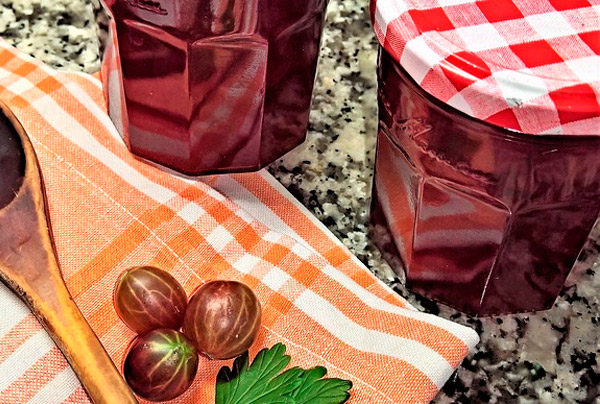
Gooseberries are rich in minerals such as chromium, zinc, copper, iron and others. Therefore jam from gooseberry is considered useful, both for the mother and the child, and even prevents hair loss due to hormonal changes in the mother's body.
Quince jam
It can be attributed to exotic types of jam, so many mothers are afraid to try it and give preference to those kinds of jam that are made from locally grown fruits. But this is not very correct, because in fact, quince is a very useful product, and quince jam almost never causes allergies. Besides astringent, sourish taste, quince is a good source of nutrients, vitamins and minerals. Consumption of 92 g of quince jam offers 0.6 mg of selenium, 13.8 mg of vitamin C, 0.12 mg of copper, 14.08 g of carbohydrates, 0.64 mg of iron, 1.7 g of total dietary fiber, 181 mg of potassium, 0.037 mg of vitamin B6 and 16 mg of phosphorus. Like most fruits, quince is rich in nutrients, such as vitamins A, B and C, fiber, as well as minerals such as potassium, copper, selenium, zinc, phosphorus, calcium, iron and magnesium. Jam from quince with low fat content. The rich nutritional value of quince makes it useful for your health in the following ways.
The intake of quince jam reduces the level of cholesterol in the body. Antioxidant activity can reduce fat oxidation, neutralize triglycerides and reduce fat found between blood vessels. In addition, the skin of quince contains a flavonoid called quercetin. This flavonoid can reduce inflammation in our blood vessels, which is a cardiac enhancer.
Flavonoid compounds and phytonutrients can reduce the degree of visual impairment, and also enhance the ripening of cones in the eye in your baby. This will help to prevent vision problems in the baby in the future and will reduce the risk of developing color dysfunction in your child.
Quince jam can help in the formation of red blood cells. Copper and iron are necessary for the new formation of blood cells. Higher levels of iron in berries can significantly improve the production of red blood cells. Deficiency of iron can lead to anemia and fatigue.
Peach jam
Has a similar structure and composition, like apricot. Considering that apricots are considered a local product, and peaches are exotic, it is recommended to reduce the level of consumption of peaches during lactation. But this does not apply to peach jam, because it is a product boiled, which is not as allergenic as fresh fruits.
About 50 grams of peach jam provides you with the following nutrients: carbohydrates, protein, fat, fiber, vitamin C, vitamin A, potassium, magnesium, iron. Peach jam is extremely rich in vitamin C, which is necessary for the formation of baby bones, 100 g of peach fruit gives you 6.6 milligrams of this vitamin. Vitamin C helps to easily absorb iron into your body, helping you and your child to prevent anemia. 100 g of peach jam gives about four micrograms of folic acid. Folic acid is an important nutrient during your lactation period. This minimizes the child's anxiety, fatigue of the mother, leg cramps. Peach jam maintains a fluid balance between the mother and the baby. Peach jam is rich in vitamins A and C and antioxidants, such as lutein, zeaxanthin and beta-cryptoxanthin. These nutrients are important for the healthy development of the eyes and the vision of the child.
The abundant potassium present in the peach is good for the blood circulation system of the baby. Excess sodium intake can be harmful to infants, since their immature kidneys can not process the mineral. They get enough from breast milk. Peaches have a low sodium content.
Peach jam contains fluoride, which is necessary for the healthy development of bones and teeth. Appropriate fluoride intake helps in preventing tooth decay or decay of teeth.
Peaches are a good source of dietary fiber, offering about 1.5 grams per 100 grams of fruit. The recommended daily dose of phosphorus during lactation is 700 milligrams, and 100 grams of peach fruits provides 20 mg of this nutrient. This helps to create strong bones both in the mother and in the growing child. Thus, peach jam gives everything that is necessary for lactation.
Fat jam
They are used to treat various diseases. Ayurveda uses figs as a cure for fevers, asthma, hemorrhages and epilepsy.
There are many health benefits provided by figs. But, there is still doubt whether it is possible to inject fig jam into the ration of a nursing mother and whether it will not be harmful to infants. It turns out that figs can be injected into baby food, and they provide the necessary vitamins and minerals that are necessary for the growth of the baby.
Ingredients preserve digestion. This advantage is especially useful in the case of infants whose digestive system is very weak and, therefore, they need very soft food. The introduction of figs into the diet of a lactating mom can help in the smooth digestion of food and improve the stool of the baby.
The need for vitamins and minerals is greater in infants and children than in adults. In infants and children, vitamins and minerals play an important role in the development of their body and brain. Minerals such as iron, copper, calcium, phosphorus, potassium, magnesium are necessary for the development of various organs in the body. Ingredic varnish is a good source of vitamins and minerals, and including figs on a regular basis may be the best option in the long run.
Improving the function of the immune system should also be the main task for the mother, if it is necessary to take into account the general health of the child. Figs can help you with this. It is known that the various biochemical and polyphenols found in it, improve the immune system.
Jam from the figs should not be prepared for long, especially if you use fresh fruits. When boiling, make sure that you do not throw away the boiled water, since the water will contain all the nutrients.
Frozen jam
It is necessary to eat very carefully. Despite the fact that it contains many vitamins, in particular vitamin C, this product has many laxatives. This can increase peristalsis in the mother and for the baby can cause diarrhea. Therefore, it is better to taste this jam after the lactation period.
Sea-buckthorn preserves
It is known for its anti-influenza action. It increases the activity of the immune system during the cold period and prevents colds. Given that the young mother can not be sick while feeding the baby, sea buckthorn jam can help in this. In addition, sea buckthorn preserves contain vitamins B, K, PP, which improves the barrier function of the baby's skin, which is so important for him during this period. But we must remember that eating sea-buckthorn jam needs fresh, made from fruits this year, since then harmful substances can accumulate there.
Cranberry preserves
Very useful for the work of the cardiovascular system. It contains a lot of vitamin K, which also allows the baby to ensure the normal operation of the blood clotting system.
For a mother, cranberry jam can be useful because of the content of active antioxidants that regulate metabolism and improve digestion.
Dogwood preserves
Used in the Arab countries, as the main means for the prevention and treatment of colds. Since this plant among our territory is not so common, it is in vain not used for the same purpose. Since nursing mothers can not use drugs during the season of diseases, in this case, canine jam can be an excellent choice. Dogwood contains pectin, organic acids, tannin, sugar, resin and vitamin C, and interestingly, it has more vitamin C than orange. It has a wide range of therapeutic effects and can be used in the following situations: sore throat, anemia, kidney disease.
Tea with dogwood can be used as a natural way to combat fever and problems with the digestive system. Tannin and pectin, as one of the main components of this plant, have a positive effect on the intestinal mucosa. Therefore, it can be recommended for nursing mothers.
Jam with breastfeeding can be an excellent source of vitamins that are not available at certain times of the year, or which can be allergens fresh. Therefore, nursing mothers should not give up jam, thinking that there is nothing useful in it. If you cook jam correctly, then you can store many nutritional elements and vitamins for your mother and her baby.
 [4]
[4]

